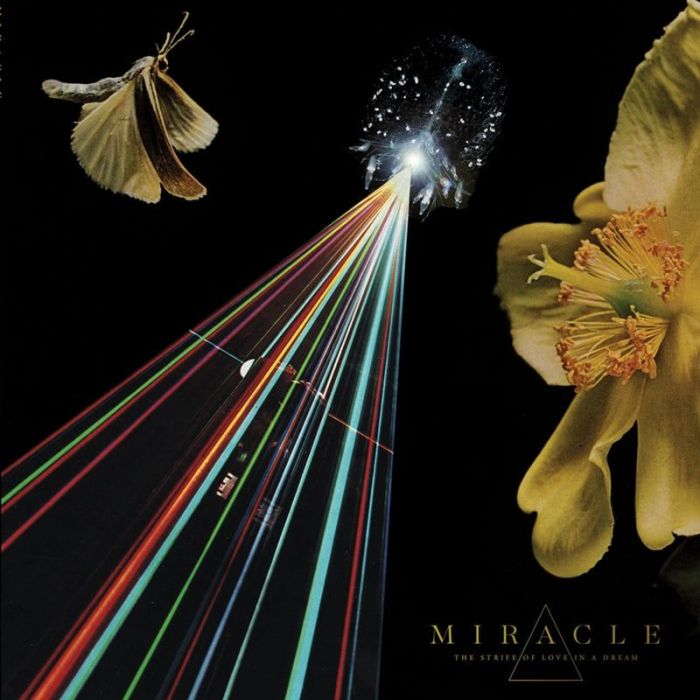Miracle’s The Strife of Love in a Dream Revels in Esoteric, Elegant Synth-Pop (Review)

Relapse Records has long been synonymous with some of the most extreme forms of metal, thanks to releases by Coalesce, Dillinger Escape Plan, Godflesh, and Neurosis (to name a few). But with recent releases from Cloakroom, Nothing, Survive, and Zombi, the label’s sound has diversified a bit, and nowadays, one can’t simply assume that a Relapse release will be “metal” in any traditional sense of the word. Even so, there will still be something extreme and uncompromising about it.
Case in point: You’ll often see Miracle’s The Strife of Love in a Dream described as “synth-pop,” which is technically true. The album’s songs are all synth-driven and some, like “Light Mind” and “The Seventeen Nineties,” are catchy in their own way. But while Depeche Mode’s Black Celebration and Violator are valid points of comparison — the duo’s rich, deep vocals bear more than a passing resemblance to David Gahan’s — Miracle’s esoteric sound taps into both an intensity and a dark elegance that’s not so easily captured by the “synth-pop” tag.
Some of that’s due to the duo’s musical pedigree. In addition to his work in Zombi, Steve Moore has composed horror soundtracks for films including Cub and The Guest. Not surprisingly, the ominous arpeggios, scattered percussion, and spectral vocals that open the album on “The Parsifal Gate” go a long way towards creating a tense, disquieting mood (especially during the song’s always-building-and-never-ending denouement). “Night Sides” conjures a similar mood with haunting keyboard arrangements à la Makeup & Vanity Set’s cinematic synthwave, as well as sinister vocals and mournful string-like arrangements.
Elsewhere, aggressive guitars (“Light Mind”) speak to the group’s metal roots (Daniel O’Sullivan has played with Sunn O))) and Ulver) while the somber manner in which “Sulfur” and “Mind Environment” unfurl imagines goth at its most ghostly and graceful. Finally, album closer “Angelix” reaches for a dance floor euphoria that’s tempered by the album’s somber atmosphere, like Underworld spinning at a rave in a decrepit castle nestled somewhere deep in the Black Forest.
Then there’s the band’s lyrics. To call them cryptic would be an understatement. One minute, the duo’s singing about cenobites and the Godhead’s feet before inquiring of the listener, “Where did you get the notion that time could turn into space?” (“The Parsifal Gate”). The next, they’re intoning “Alone I made a door to which I found no key/Alone I made a key to which I found no door” (“Sulfur”) and imploring the listener to “focus on the shadows and the sounds/Of the man outside your window/Vaporous and lost and crying out” (“Dreamours”).
The only song that has an immediately apparent narrative is “Night Sides,” in which a woman’s life is upended by her burgeoning psychic powers (“She fears her own power/She never recognised her ability to heal”). And yet, rather than make the album seem insufferably pretentious, the enigmatic lyrics only add to its allure. One can’t help but wonder if Moore and O’Sullivan are drawing from arcane texts, ancient images, and obscure rituals for lyrical inspiration.
(This might not be too far from the truth, actually. The album’s title comes from a 15th century text about dreams titled Hypnerotomachia Poliphili, and the band has described the album as being about “saturated phenomenology,” “the death of allegory,” and “the multiverse as hypostatic union” — so take that for whatever it’s worth.)
The Strife of Love in a Dream didn’t quite click with me at first; I appreciated what the duo were trying to do but something kept the album at arm’s length. And then one day, all of the pieces fell into place and the band’s spell was complete. Since then, I’ve been unable to shake its hold. With their musical alchemy, Moore and O’Sullivan have taken the sounds and aesthetics of decades long since past and reshaped them into strange and thrilling new forms.